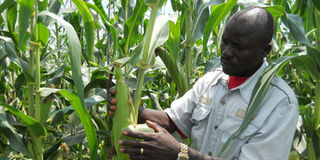Farmer's Diary: Don’t keep seeds from previous harvests

The hybrid maize crop may have good yields but the seed you save from it may never perform as well as its parent plant. So it is advisable to buy new hybrid seed every planting season. Photo by Michael J. Ssali
It is common practice among our farmers to keep part of the harvested grain as seeds for the next planting season. Usually, the farmer keeps the best looking seeds believing that they will grow and provide maximum yields. Some grain varieties are favoured for their taste or for just their colour. Other factors considered in seed choice have to do with quick growth and maturity as well as resistance to disease and drought. Yet another basis for seed selection is the distinct good performance of the parent stock.
For centuries, farmers have sought to plant the best seeds and have always been keen to try out crop breeds known for optimum yields. For example, a visitor in a fellow farmer’s home may admire the performance and appearance of the maize crop there and goes ahead to ask for some of the harvested maize to use at her garden for the next planting season.
This kind of seed exchange is known as the traditional or informal way of seed acquisition by farmers.
The traditional way
About 80 per cent of our people still acquire their seeds that way and indeed most of the crops we grow today trace their existence back to our ancestors’ great seed saving skills. This has also been the case for the other sprouting crops such as cassava, plantain, and potatoes among others. It used to be the same story even in other parts of the world before the arrival of seed breeders and commercial seed companies. Anyone who read Daniel Defoe’s novel, Robinson Crusoe, probably remembers the chance discovery of a maize grain on the wrecked ship which lonely Crusoe planted on the island and managed to eventually grow his own maize.
However, over time, it has been observed that generally, seeds acquired in this way have tended to be low yielding, genetically weak, and susceptible to disease, which accounts for the general low agricultural production that we are apparently confounded in here in Africa.
Let it not appear though as if poor yields are always due to poor quality seed. We have other factors such as bad weather conditions, poor soils, bad farming practices and pest attack among others. We have to accept that we live in changed times today and we have new challenges, such as a much bigger population to feed amidst other problems visited upon us by the effects of climate change including prolonged droughts, and new crop diseases. We cannot go on turning our backs on biotechnology and continue practicing agriculture exactly the way it was practiced by our forefathers.
Plant scientists and seed breeders have come up with improved planting material and seed that is guaranteed to multiply and increase yields.
We have hybrid seed that is produced after careful tests by scientists in the field which involve crossing separate and well selected good performing ‘parent’ plants. When two well selected parent plants are crossed (mated) the resulting child will have all the vigor and strength to grow well and even carry the general characteristics of their parents. Their pollination is directed and somehow controlled by the scientists in the field. These are what we call hybrid seeds.
However, when we save seed from the first generation of the hybrid plant, we run a big risk of getting poor quality plants because when they are in our gardens, they undergo open pollination by wind and insects. Unlike the plant scientists and seed breeders, the insects and the wind don’t bother selecting particular parent stocks. So the seed you get may never perform as well as its parent plant.
We now have seed companies that sell their products in farmers’ shops in nearly every town. For best results, farmers are encouraged to buy hybrid seeds every planting season instead of saving seeds from previous harvests or just getting them from other farmers. Scientists have also come up with improved planting material of other crops such as cassava, sweet potatoes, coffee (cloned coffee) and other crops, which we should all embrace.




